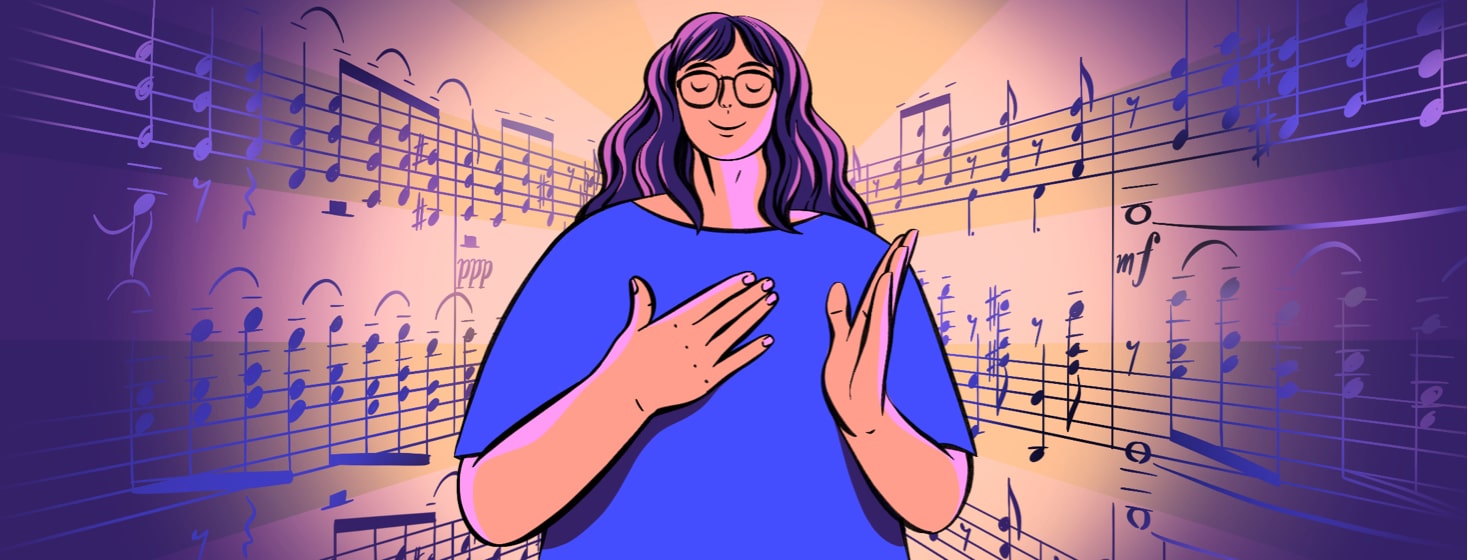Positivity and Reinvention
HealthUnion has a great podcast called Living With. It features many of the fascinating people who contribute articles and moderate our communities.
Recently, I was honored to participate in “Living with RA: A Podcast Interview with Lisa Emrich.” In listening to myself, I sounded so positive and upbeat. I felt very positive and upbeat when I spoke with Emily Downward, which is a good thing.
Life before RA revolved around music
One topic we touched upon during our conversation was how rheumatoid arthritis had affected my ability to participate as a musician. My background is as a classically-trained musician with a performance emphasis on french horn and piano. I also have a background in music education, music theory, brass pedagogy, and period instrument performance.
Before RA, my life was all about music. I enjoyed performing and teaching. At one point, I had 44 private students each week (which was absolutely crazy). It took three spring studio recitals to allow everybody a chance to play just a couple of songs for their friends and family.
My passion became painful
When RA started to interfere with my ability to play piano, it was devastating. I was in a lot of pain and lost fine control of my hands and fingers. At one point, my neurologist thought I had carpal tunnel syndrome and recommended surgery. At the same time, I dreamt of the pain relief I might experience if I could cut my arms off at the elbow. Thankfully that was not a viable option for achieving relief from RA.
Eventually I saw a rheumatologist and was diagnosed with seronegative rheumatoid arthritis involving several joints. She immediately prescribed occupational therapy to protect me from further deformation in my hands and medication to try to control the disease. Fortunately, both worked well for me.
Knowing that RA was affecting my piano life was hard. At the time, the parents of my piano students commented that I could teach without even touching the keyboard because of my teaching style and skills. My students had already been well-trained, and my words were descriptive and encouraging. There were months when I did hardly touch the piano keyboard during or outside of piano lessons.
Finding ways to adapt
Not long ago, I met a member of our RA community who is also a musician. She expressed deep hurt and sadness about not being about to use her hands the way she once had. I could totally relate. While she described not being able to play for hours, I’ve previously described not being able to perform some pieces composed by Liszt or Rachmaninoff.
A huge chunk of our identities seemingly disappeared overnight for both of us. But as I mentioned in the podcast interview, adaptation has the power to make the impossible possible. While it may be hard to see new ways to continue a passion, it is important for anybody, whether they have RA or another chronic illness, to know that our passions are much greater than our abilities to do things the ways they’ve always been done.
Reinventing myself
Sometimes you have to reinvent yourself. And you have to be patient with yourself while you do so. For me, piano is not something I practice 6-8 hours each day as I did in college. I had to evolve as my life grew away from the protected environment of college. As a piano teacher, I have given myself the luxury of teaching students who are passionate about learning. That has resulted in a smaller music studio but a more fulfilling one. As a professional accompanist, I will be selective in the jobs I take. No longer will I toil for weeks on end, basically without pay, to try to perform a Hindemith Sonata or accompany a Hindemith Concerto.
The music will always be part of me. It can never leave me. I might not always be able to ask my fingers to create the sounds coming from my heart, but I will always be able to allow my heart to send its song out into the world.
Be well,
LisaDo you have any thoughts on reinvention after developing a chronic illness? Please share in the comments below.

Join the conversation